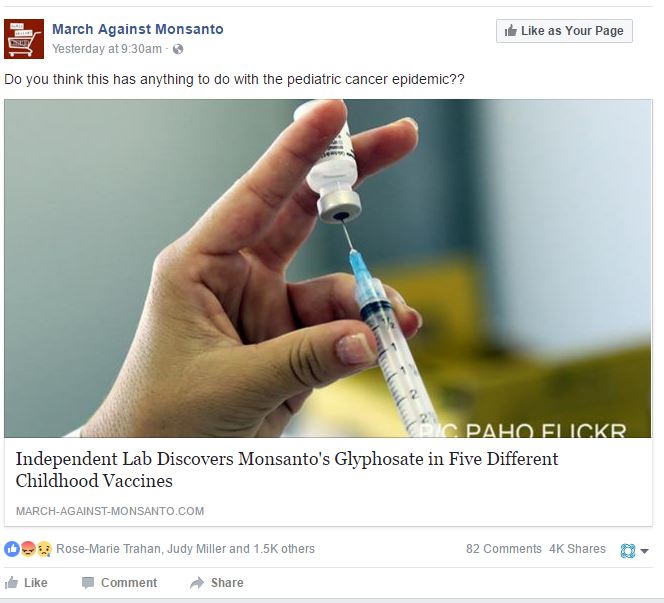Various reviews and international assessments have found that glyphosate does not lead to cancer in humans but environmental groups and their allies insist it does. This meta-analysis, a review of existing papers, focused on the most highly exposed groups in papers and claims that the link between glyphosate and Non-Hodgkin Lymphoma is greater than the science consensus and government regulatory bodies state.
Non-Hodgkin Lymphoma is the type of cancer that a groundskeeper in San Francisco, near where one of the authors lives, acquired. A trial lawyer filed a lawsuit, blaming it on the weedkiller despite there being no known mechanism where it could act in humans, and a controversial ruling in San Francisco declared that Monsanto lawyers were unable to prove their product didn't cause cancer. Another judge later threw out the punitive judgment but there have been thousands of new lawsuits filed regardless.
Opposed to the consensus
The authors of the new paper seem to have gone into it to promote their belief that the weedkiller is harming mankind. “Our analysis focused on providing the best possible answer to the question of whether or not glyphosate is carcinogenic,” said senior author Lianne Sheppard, a statistics professor at the University of Washington, in their press release. “As a result of this research, I am even more convinced that it is.”
As scientists concerned about the use of statistics to create harm in more and more places might expect, the U.S National Institute of Environmental Health Services (NIEHS), a government epidemiology group dedicated to creating concern about agriculture and chemicals, funded the work.

Look for west coast statisticians to set out to rationalize this claim next.
A statistical analysis of statistical analyses is not science
The paper did no studies, it measured no chemicals, it examined no cancer patients, it was instead simply a review of other papers published between 2001 and 2018. Regardless of the clear agenda of the senior author (ideological conflicts of interest need not be declared) reviewers gave the paper concluding that that exposure to glyphosate may increase the risk of Non-Hodgkin Lymphoma by as much as 41 percent a pass, even though the brew was a mix of human and animal data, a red flag at more reputable journals, and threw very different methods into one mixture.
The problem with such a method is that one truly authoritative study, such as ~54,000 regular applicators with no increased instances of cancer, can be diluted by mixing in small studies using high doses and averaging the results out as if they are equal in power. And that is what happened here. They intentionally included support for Gilles-Éric Séralini, despite his work being retracted, and disgraced organic industry economist Chuck Benbrook. In their press release, one of the co-authors gushed that their paper affirmed a similar outlier claim by the International Agency for Research on Cancer (“These findings are aligned with a prior assessment from the International Agency for Research on Cancer, which classified glyphosate as a ‘probable human carcinogen’ in 2015”), despite that report being exposed as manipulated by paid participants from environmental groups who even signed contracts with trial lawyers to testify as expert witnesses before the report was released. Who funds IARC and provides many of its epidemiologists? The same NIEHS that funded this paper.
Last week, Friends of the Earth claimed its hand-picked laboratory found residues of glyphosate in numerous common foods, though they have refused to release the results and their methodology document has been criticized by mainstream scientists. It's been a difficult month for science, and the public who benefits from it.






Comments